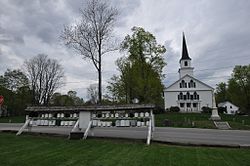Nelson, New Hampshire
| Nelson, New Hampshire | |
|---|---|
| Town | |

Nelson Community Church and the town's iconic row of mailboxes
|
|
 Location in Cheshire County, New Hampshire |
|
| Coordinates: 42°59′22″N 72°07′40″W / 42.98944°N 72.12778°WCoordinates: 42°59′22″N 72°07′40″W / 42.98944°N 72.12778°W | |
| Country | United States |
| State | New Hampshire |
| County | Cheshire |
| Incorporated | 1774 |
| Government | |
| • Board of Selectmen | David Upton, Chair Susan Hansel Maury Collins |
| Area | |
| • Total | 23.2 sq mi (60.2 km2) |
| • Land | 21.9 sq mi (56.6 km2) |
| • Water | 1.4 sq mi (3.6 km2) 5.94% |
| Elevation | 1,493 ft (455 m) |
| Population (2010) | |
| • Total | 729 |
| • Density | 31/sq mi (12/km2) |
| Time zone | Eastern (UTC-5) |
| • Summer (DST) | Eastern (UTC-4) |
| ZIP code | 03457 |
| Area code(s) | 603 |
| FIPS code | 33-50580 |
| GNIS feature ID | 0873673 |
| Website | www |
Nelson is a town in Cheshire County, New Hampshire, United States. The population was 729 at the 2010 census. Nelson includes the village of Munsonville.
Originally named Monadnock No. 6, the town was granted in 1752 by Governor Benning Wentworth. It was first settled in 1767 by Breed Batchelder. On February 22, 1774, the town was incorporated by Governor John Wentworth as Packersfield, after a major proprietor, Thomas Packer, the sheriff at Portsmouth. The name was changed in 1814 to Nelson in honor of Viscount Horatio Nelson, British admiral and naval hero.
Located on the height of land separating the watersheds of the Connecticut and Merrimack rivers, Nelson became primarily an agricultural community. The uneven surface proved good for grazing. But with streams rising from four ponds to provide water power, it also developed industry. The village of Munsonville, situated on the stage line at the outlet of Granite Lake, manufactured cotton cloth and chairs. The L. J. Colony Chair Co. produced between 25,000 and 30,000 chairs annually, hiring women and children from local farms to weave the rattan seats and backs. At one time, Munsonville had 1,000 homesteads and 10 school districts. The mills have since closed, and Munsonville is today a resort of summer homes.
...
Wikipedia
